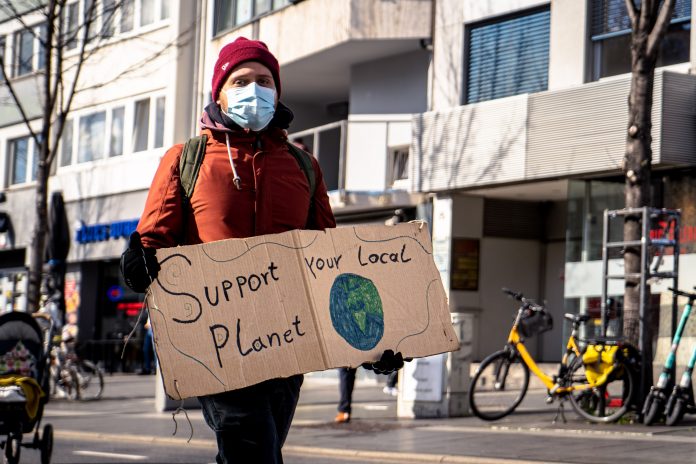Christopher Graham suggests opportunities for the global ELT community
It’s been estimated that the number of people studying English around the world at any time is 1.5 billion. That’s a lot. Equally, English is the language of much of the climate change debate and indeed of environmental protest. There’s a certain satisfaction in looking at the scale of the ELT professional community and seeing our potential to be global influencers and a force for good being realised, through both our ‘green’ workplace behaviours and what we teach in terms of climate change. ELT work being done on the climate emergency globally shows what we can achieve.
At the 2019 Innovate conference in Barcelona, Daniel Barber threw down the gauntlet by declaring a climate emergency in ELT and many people saw that as a call to action.
Since then, ELT Footprint has appeared, won an ELTons Innovation Award and gained over 3,500 Facebook followers. Additionally, ELT Footprint UK is making its mark on the private language school sector in the UK, and institutions and teachers internationally are beginning to develop the skills to integrate climate change education into ELT.
This year the UK is co-hosting the 26th UN Climate Change Conference, and the British Council has been pivotal in both supporting these initiatives and highlighting and documenting examples of best practice
“There is increasing integration of climate issues into classes”
under the Climate Action in Language Education umbrella.
Climate Action in Language Education has four strands, each of which supports teachers wanting to integrate climate topics into their teaching. The first strand comprises a podcast series exploring the intersection of the climate crisis and language education, and championing environmentally based ELT initiatives globally. In partnership with Oxford University Press, each podcast episode shares more about the origins of climate-related language in both English and other languages.
The second is a series of professional development modules to support teachers in producing climate-related lessons and making sustainability part of students’ lives, with over 4,000 teachers from more than 100 countries doing the training so far. The third strand is a series of 12 lesson plans at a range of levels and age groups, each around a key climate change or sustainability topic. The plans are supported by a booklet with ideas around climate education in ELT.
The fourth strand is the Climate Action in Language Education report. With Deepa Mirchandani, I am the author of the report, and want to share some of the broader findings, but first let’s explore the rationale and methodology.
The purpose of the report is quite simple. To put a spotlight on good practices globally, and to inspire and encourage reflection and action. The approach to the report is international and cross-stakeholder, as we wanted to get a snapshot of the current state of affairs, as well as look into the near future. The analysis looked at both how we do things in ELT (teach, produce books and measure progress) and what we teach in terms of climate content. The whole project has been under the shadow of Covid-19, but our interviews explore any environmental Covid dividends, as well as the climate impact of the rapid movement online.
The stakeholders in the report included students, teachers, institutions, assessment bodies, teacher and school associations, and publishers. Information and perspectives were collected by four online surveys and a series of interviews.
Let’s look briefly at some at some key findings. This is no more than an overview and the full report will be available for download by anybody. There were three overall general standouts for me:
- The ELT community is increasingly engaging with its environmental footprint and its role in climate education, with many of the initiatives being grassroot or ‘bottom up’. Individual institutions, teachers or indeed students are making the running.
- The projects are largely piecemeal, with very little sharing of ideas and this seemed to apply even within organisations. We hope this report and the other elements of Climate Action in Language Education will help to facilitate more sharing.
- Actions were often ‘de-centred’. Some of the most exciting projects were in non-English medium countries, many in developing economies.
Looking stakeholder by stakeholder, we found that among the publishers there seems to be clear progress on carbon footprint reduction in terms of how they produce and distribute books. However, the idea of climate change issues being embedded into course books (rather than in just one unit) is still only beginning to be embraced.

Among teachers, there is increasing integration of climate issues into classes, although this is not universally the case and teachers mention needing professional development around integrating of topics.
Students specified that they would welcome climate topics being included in their ELT classes. Interestingly however, there is significant student anxiety around the climate crisis demonstrated by the words they use to describe their feelings. These include ‘worried’, ‘scared’, ‘sad’ and ‘ignorance’. This has implications for how teachers and course book writers approach climate-related issues. The report will be available from late August at https://www. britishcouncil.org/climate-connection, but you don’t need to read it to consider what you can do to reduce your footprint and bring climate education into your teaching. You just need to try and to share.
Footnote
Free training modules on climate action will run throughout the year. Visit the following;
■ Training https://www.teachingenglish.org. uk/training
■ Podcast https://www.teachingenglish.org. uk/professional-development/podcast
■ Lesson plans https://www.teachingenglish. org.uk/article/climate-action-language- education-lesson-plans

Christopher Graham holds a degree in Politics from Warwick University, a Cambridge DELTA and is a Fellow of the Royal Society of Arts. He is an ELT consultant and writer, and has worked in the field since 1981 in over 30 countries for the British Council, ministries of education and publishers. One of the founders of ELT Footprint, a 2020 ELTons winner, he is currently working for the British Council on the Climate Action in Language Education project as a researcher and author.







